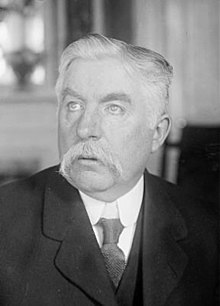Edward Morris, 1st Baron Morris
The Lord Morris | |
|---|---|
 | |
| 2nd Prime Minister of Newfoundland | |
| In office March 2, 1909 – December 31, 1917 | |
| Monarch | Edward VII George V |
| Governor | William MacGregor William Horwood (acting) Ralph Champneys Williams Walter Edward Davidson Charles Alexander Harris |
| Preceded by | Robert Bond |
| Succeeded by | John Chalker Crosbie |
| Personal details | |
| Born | May 8, 1859 St. John's, Colony of Newfoundland |
| Died | October 24, 1935 (aged 76) London, United Kingdom |
| Political party | People's Party |
| Profession | Lawyer |
Edward Patrick Morris, 1st Baron Morris KCMG PC (May 8, 1859 – October 24, 1935) was a Newfoundlander lawyer and Prime Minister of Newfoundland.[1]
Born in St. John's, the son of Edward Morris and Catherine Fitzgerald, he was educated at Saint Bonaventure's College and the University of Ottawa, was admitted to the bar in 1885 and went into practice with his brother Francis.[2] In 1901, he married Isabel Langrishe. Morris was a counsel for the British government during the North American fisheries arbitration in 1910 receiving a knighthood in 1904. Morris served as governor of the from 1889 to 1913 and was elected to the Newfoundland House of Assembly in 1885 as an independent. He joined the Liberal government of Sir William Whiteway as Attorney-General from 1889 to 1895.[3]
Morris was the most senior Roman Catholic politician in Newfoundland and had enormous influence as a result. He had a strained relationship with Whiteway's successor as Liberal leader, Sir Robert Bond, splitting with him[1] to form the Independent Party which he led from 1898 to 1900. Morris formed an alliance with Bond to defeat the Tories and served as minister of justice from 1900 to 1907 in Bond's government. In 1907 he again broke with Bond and formed the People's Party.[1] Both parties tied in the 1908 General Election. Robert Bond was asked to form a government. He refused saying he could not because he could not elect a speaker, without losing a vote and thereby bringing down the government. Morris said he could form a government and was made Prime Minister. He lost a confidence vote and then called an election. He led his party to victory in the 1909 election with a clear majority. He served in that position through the First World War and represented Newfoundland at the Imperial War Conference in London.[2]
His People's Party government enjoyed strong support from the dominion's Catholics but was largely opposed by Protestants. As a result of a wartime crisis over conscription, and the decline of his popularity due to accusations of wartime profiteering and conflict of interest, Morris decided that it was necessary to have a government that had support from all denominations[2] and so he invited the opposition in the House of Assembly to join a National Government which was formed in 1917 to oversee the duration of the war. Morris retired from politics at the end of 1917 after eight years in power.[1]
Morris was made a Knight Commander in the Order of St Michael and St George in 1913.[3]
On 15 January 1918, Morris was elevated to the peerage[1] as the first Baron Morris, of St John's in the Dominion of Newfoundland and of the City of Waterford,[4] the only Newfoundland-born person to ever be so honoured. Lord Morris moved to London and took his seat in the House of Lords. He lived the rest of his life there, only returning to Newfoundland once. He died in London, in 1935, at the age of 76.[3]
References[]
- ^ Jump up to: a b c d e Hiller, JK (December 15, 2013). "Edward Patrick Morris, 1st Baron Morris". The Canadian Encyclopedia (online ed.). Historica Canada.
- ^ Jump up to: a b c "Morris, Edward Patrick". Encyclopedia of Newfoundland and Labrador. pp. 622–24.
- ^ Jump up to: a b c "Newfoundland Biography". Newfoundland History. Marianopolis College. Retrieved 22 July 2012.
- ^ "No. 30522". The London Gazette. 12 February 1918. p. 1942.
External links[]
- Chisholm, Hugh, ed. (1922). . Encyclopædia Britannica (12th ed.). London & New York: The Encyclopædia Britannica Company.
- 1859 births
- 1935 deaths
- Prime Ministers of the Dominion of Newfoundland
- Barons in the Peerage of the United Kingdom
- University of Ottawa alumni
- Newfoundland People's Party MHAs
- Knights Commander of the Order of St Michael and St George
- Attorneys-General of Newfoundland Colony
- Knights Bachelor
- Canadian members of the Privy Council of the United Kingdom
- Peers created by George V